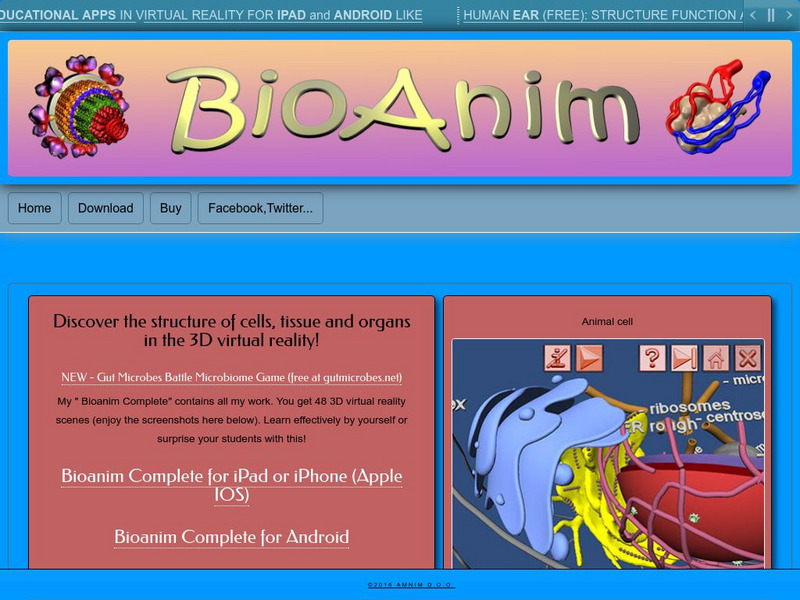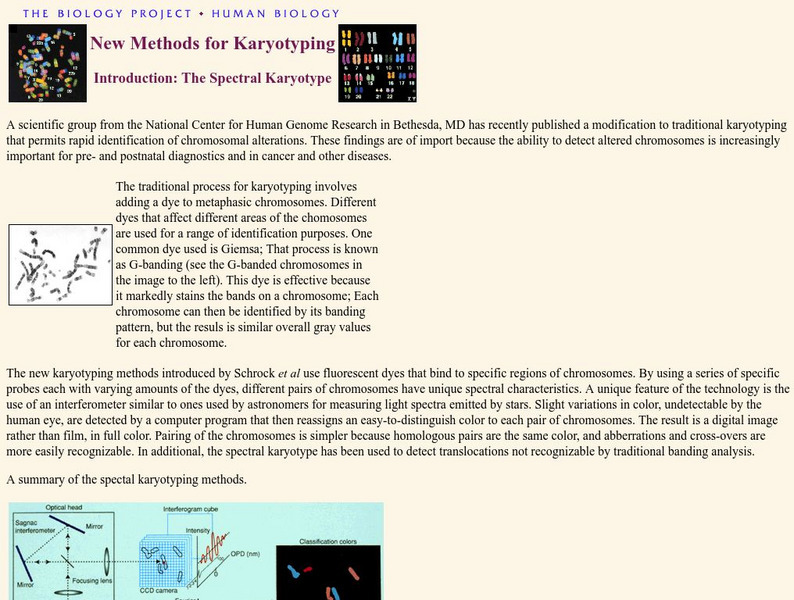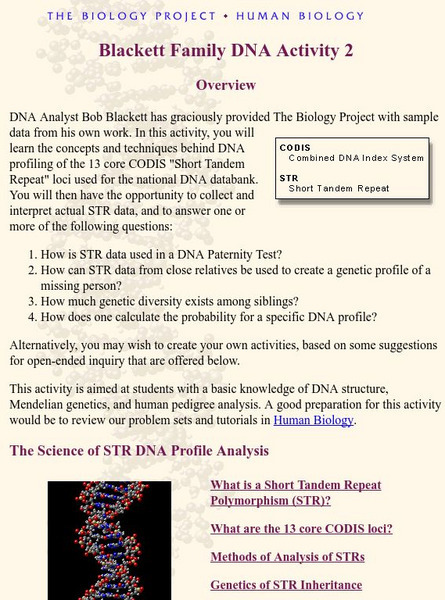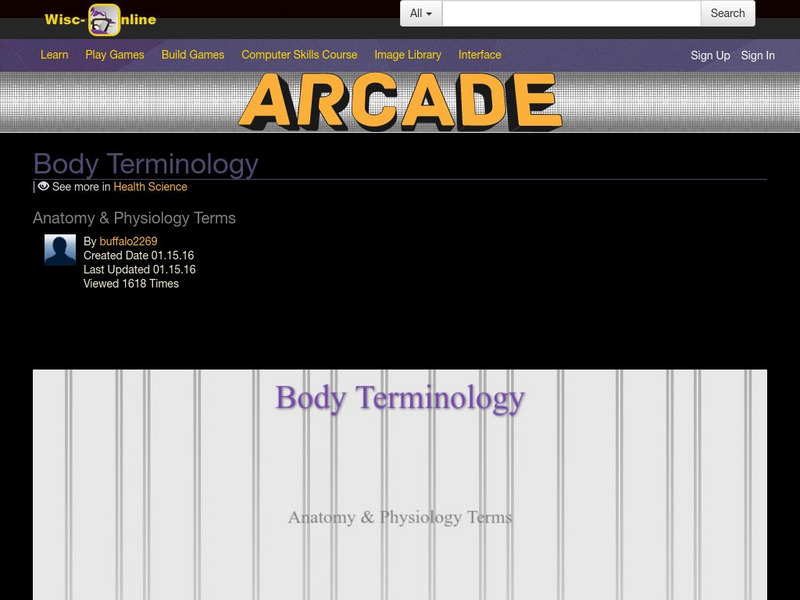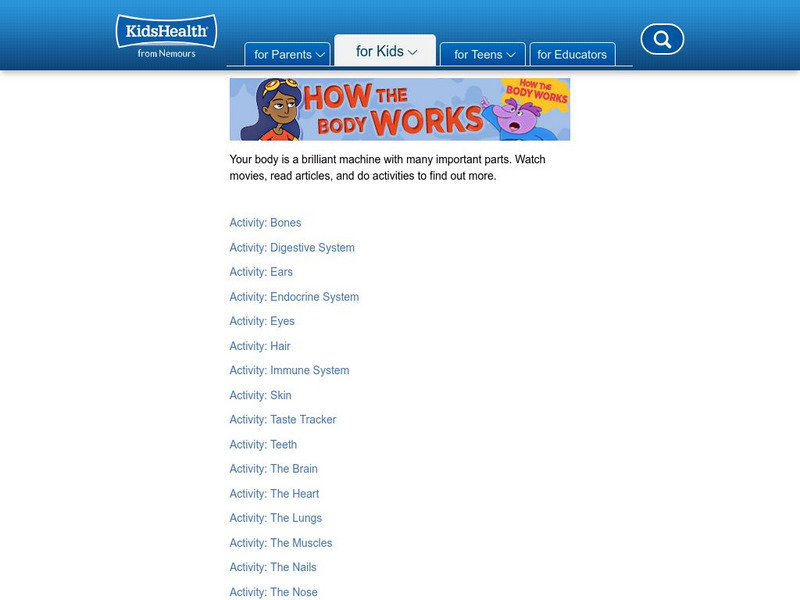Other
Bio Anim
BioAnin presents 3-D labeled images of all of the major systems of the human body, for example, the digestive system and the endocrine system. The images are embedded in slideshows. The site also has interactive 3-D models that can be...
CK-12 Foundation
Ck 12: Biology: Human Body: Organization Study Guide
This comprehensive study guide covers the main terms and concepts needed for a unit on the organization levels in the human body from organ systems to cells.
CK-12 Foundation
Ck 12: Life Science: Human Skeletal System
[Free Registration/Login may be required to access all resource tools.] How important is your skeleton? Can you imagine your body without it? You would be a wobbly pile of muscle and internal organs, and you would not be able to move....
OpenStax
Open Stax: Anatomy & Physiology: The Peripheral Nervous System
Describe the structures found in the peripheral nervous system and the functions of those parts in the human body.
OpenStax
Open Stax: Functions of Human Life
The different organ systems each have different functions and therefore unique roles to perform in physiology. These many functions can be summarized in terms of a few that we might consider definitive of human life. Learn here about the...
TED Talks
Ted: Ted Ed: If Superpowers Were Real: Body Mass
What if manipulating body mass wasn't just the stuff of fantasies and comics? Is it scientifically possible to manipulate your body mass? In this series, creator and educator Joy Lin tackles superpowers and reveals just how...
PBS
Pbs: How Art Made the World: Human Body in Egypitan Art
PBS documentary considers how ancient Egyptian artists chose to represent the human body and answers questions about how the cultural values of a society, such as the desire for order, shape its art. With close-ups of Egyptian art that...
University of Arizona
The Biology Project: Human Biology: New Methods for Karyotyping
Read about the findings from the scientific group from the National Center for Human Genome Research, which published a modification to traditional karyotyping that permits rapid identification of chromosomal alterations.
Other
Get Body Smart: Human Nervous System: Anatomy and Physiology
The innovative tutorial investigates the human nervous system. Some topics explored are nerve cells, support cells, neurophysiology, brain, and spinal cord. Visual quizzes are also included.
University of Arizona
The Biology Project: Human Biology: Blackett Family Dna Activity
Family studies are a good way to learn about DNA profiling and RFLP analysis because students can follow the inheritance of DNA markers from one generation to the next. Students have the opportunity to do this in this activity.
University of Arizona
The Biology Project: Human Biology: Blackett Family Dna Activity 2
In this activity, students learn the concepts and techniques behind DNA profiling of the national DNA databank. Students will then have the opportunity to collect and interpret actual STR data, and to answer one or more questions.
Untamed Science
Untamed Science: Biology: Human Biology: Lymphatic System
Find out how the body rids itself of wastes and fights off infections with the help of the lymph nodes and white blood cells.
Untamed Science
Untamed Science: Biology: Human Biology: Circulatory System
Read and watch how the blood, the heart, and the blood vessels keep the blood flowing through our bodies. [6:00]
PBS
Pbs Learning Media: Map of the Human Heart
See how the human heart moves blood through the body in this animated feature from the NOVA: "Cut to the Heart" Web site.
Wisc-Online
Wisc Online: Body Terminology Baseball
Answer the anatomy and physiology questions correctly, and score a homerun!
National Cancer Institute at the National Institutes of Health
Seer Training Modules: Introduction to the Muscular System
Self-guided learning activity where students learn about the structure and function of the human muscular system. There is a short quiz at the end of the lesson to check for understanding.
National Cancer Institute at the National Institutes of Health
Seer Training Modules: Introduction to the Lymphatic System
Self-guided learning activity where students learn about the structure and function of the human lymphatic system. There is a short quiz at the end of the lesson to check for understanding.
Other
Inside the Human Body: The Respiratory System (Grades 1 3)
Students in grades one through three will love learning about the body's respiratory system through a variety of fun and interactive activities. Particularly engaging is the online storybook that teaches children about the heart and...
Curated OER
Kids Health: A How the Body Works
This resource provides complete, mini-learning modules about different aspects of the human body. Click on the eyeball to focus your search.
TeachEngineering
Teach Engineering: How Do Human Sensors Work?
This lesson highlights the similarities between human sensors and their engineering counterparts. Taking this approach enables students to view the human body as a system, that is, from the perspective of an engineer. Humans have...
National Cancer Institute at the National Institutes of Health
Seer Training Modules: Introduction to the Nervous System
Self-guided learning activity where students learn about the structure and function of the human nervous system. There is a short quiz at the end of the lesson to check for understanding.
National Cancer Institute at the National Institutes of Health
Seer Training Modules: Introduction to the Skeletal System
Self-guided learning activity where students learn about the structure and function of the human skeletal system. There is a short quiz at the end of the lesson to check for understanding.
National Cancer Institute at the National Institutes of Health
Seer Training Modules: Introduction to the Cardiovascular System
Self-guided learning activity where students learn about the structure and function of the human cardiovascular system. There is a short quiz at the end of the lesson to check for understanding.
National Cancer Institute at the National Institutes of Health
Seer Training Modules: Introduction to the Digestive System
Self-guided learning activity where students learn about the structure and function of the human digestive system. There is a short quiz at the end of the lesson to check for understanding.
